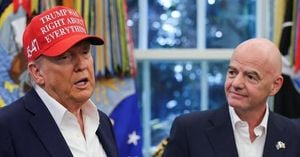In a significant move reflecting ongoing tensions in international trade, China’s Ministry of Commerce has called on the United States to completely eliminate its "reciprocal tariffs." This statement came on Sunday, April 13, 2025, following the U.S. government's recent decision to exempt certain products, including computers, smartphones, and semiconductor manufacturing equipment, from these tariffs.
The spokesperson for the Ministry emphasized that while this exemption is a small step toward correcting what they see as the U.S.'s misguided unilateral tariff strategy, it is not enough. "This practice hasn’t resolved the United States' problems but has seriously undermined the international economic and trade order," the spokesperson noted. They further pointed out that the tariffs have disrupted normal business operations and negatively affected daily consumption for people across both nations.
China is currently assessing the impacts of the U.S. memorandum, with officials urging a return to dialogue grounded in mutual respect and equality. The spokesperson reiterated that there are no winners in a trade war and that protectionism offers no viable solutions. They urged the U.S. to heed the rational voices from both the international community and domestic stakeholders, calling for significant steps to address these issues.
Meanwhile, on the same day, Germany’s Federal Statistical Office released data highlighting the U.S. as the largest market for German exports, accounting for approximately 10.4% of the country’s total exports in 2024. This figure represents a substantial €161.3 billion ($183.66 billion) worth of goods, marking the highest export level Germany has seen in 22 years.
The U.S. market is particularly vital for German pharmaceutical products, with 23.8% of Germany’s pharma exports, valued at around €27 billion, directed to the United States. Additionally, the U.S. is a key destination for German machinery, medical devices, aviation technologies, and automobiles. Notably, 34.4% of immunological products exported from Germany last year, including antisera, vaccines, and blood, were shipped to the U.S., along with 25.6% of exported engines and gas turbines.
Despite these robust trade ties, the relationship has been strained by U.S. tariff policies. Germany is currently facing a 10% tariff on its exports to the United States, with an additional 20% levy looming, despite a temporary reprieve granted by President Donald Trump last week, around April 7, 2025. This tariff situation has created significant uncertainty and risk for German businesses, particularly in sectors like pharmaceuticals, medical technology, and automotive manufacturing.
Germany's Federal Statistical Office, known as Destatis, warned that these tariffs could hinder trade and investment links between the two nations, especially at a time when Germany’s economy is already grappling with stagnation. Economists have expressed concerns that the ongoing trade turmoil could push Germany into a third consecutive year of recession.
In light of these challenges, Destatis noted that tariffs on German exports to the U.S. have hit critical sectors particularly hard. "The United States is the most important sales market for many export goods from these sectors," the report stated, underlining the interconnectedness of the U.S. and German economies.
As global economic dynamics continue to shift, the responses from both China and Germany highlight the complexities of international trade relations. Both nations are advocating for a return to more stable and equitable trade practices, emphasizing the need for dialogue and cooperation over conflict.
The ongoing situation remains fluid, with potential repercussions for global markets and economies. As China assesses the impact of the U.S. tariff exemptions and Germany navigates its trade relationship under the weight of tariffs, the international community watches closely, hoping for resolutions that foster economic stability and growth.





